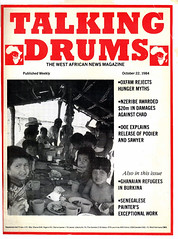Music And Arts Scene
African Records Review
By Kwabena Asamoah
GEORGE DARKO: 'Hi-Life Time' (OVAL RECORDS OVLP 509). Highlife time' 'Kaakyire Nua Child- ren's Song / Akoo Te Brofo' 'Medo Menuanom'.
Readers will definitely jump with ecstasy that the indomitable George Darko has hit them with another album. But hold your breath. This album is only a compressed edition of Friends and Hi-Life Time albums into one by Oval Records who have recently acquired the licence to release George Darko's music in the UK and elsewhere. The difference between the original Hi-Life Time released on George Darko's own Okoman label and this one is only minimal. Only Odoyewu' is missing from the new one. Is that not significant? Oval Records should have found a more distinctive title to avoid confusion. They, however, give you what might be regarded as the best of George Darko. George Darko's blend of hi-life and funk has reached the clubs in London and many parts of Europe. The radios are also celebrating with this pounding rhythm, especially 'Hi-Life time'. The only track which is not necessarily attractive is 'Medo Menuanom' simply because it drags on a bit too much from the middle to the end.The history of 'Akoo Te Brofo' is old to many, especially Ghanaians but the song is not. The freshness of the sound propped by George Darko's skilful guitar, Bob Fiscian's synthesizer, Staphan Mill's lyrical sax and Lee Dodou's excellent voice still registered the track as one of the best to have come out of Ghanaian musicians. The lyrics nearly miss the point but the music is superb.
What is stirring Europe and America is 'Hi-Life Time' which is merely the English version of 'Akoo Te Brofo'. The rhythm is skilfully built on C.K. Mann's 'Nyimpa Rebre' and incorpor- ates a driving beat that gives it a funky feel. George Darko calls it 'boogie hi- life'. What you will not fail to pick is Lee Dodou's hypnotic voice that has made a lot of difference in George Darko's music. The other addition to the taste of Westerners is 'Children's Song' which is also sung in English.
The stand-out track remains 'Kaakyire Nua' the lyrics of which gave me goose pimples the first time I heard it. Punters have observed the guitar influences on George Darko's style of playing, namely Koo Nimo's traditional guitar versus George Benson's jazz funk guitar. Underlying every- thing in this track is what sounds like Kwame Gyasi's 'Onua Se Menni Bi' which is only an adaptation of 'Yaa merging the various influences is Amponsah'. George Darko's way of certainly his forte. But you cannot ignore the compliment of the session musicians whose skill and individual contributions have greatly enhanced the beauty of this album. Don't miss this album.
TSHALA MUANA: 'Mbanda Matiere' (AFRICAN SOUNDS SAS 051) 'Mbanda Matiere' 'Chéri Mamadou' That crumbles even majestic mountains 'N'galula'/'Koumba' 'Faute Ya Famille'.
Few years ago there were a limited number of female singers even on the Zairean pop scene, but the sudden appearance of Mbilia Bel, Mpongo Love and others has stirred up a different interest in the entire Zairean and African music. Tshala Muana is another lady added to this small number. She has two things to offer: beautiful singing and magical sexy waist dancing which she grasped She exclaims...softly.... during her infancy while going through the "mutuashi" dance.Not only does she introduce the familiar Zairean rhythm patterns of soukous and rhumba but also the less played soukouma in 'Chéri Mamadou which is of a gentler extraction.
Like the other Zairean girls Tshala Muana also had a brief spell in Abidjan, Ivory Coast before continuing to France. In 'N'galula' she cites friends whom she might have met on the scene while there - Aicha Koné, Diane Solo, Mauro, Bailly Spinto, Jimmy Hyacinthe and many others including her new husband Francois Kassey's hot guitar which continues to Lougan who has sung in Abidjan for years. At the basis of it all is Souzy ring in 'Koumba', one of my favour-ites. It has a salsa feel but retains its rootsy Zairean hook.
As dance tunes your best bet will be 'Faute Ya Famille' and 'Mbanda darko Matiere'. The adventure of youthfulness drives Tshala Muana to introduce synthesizer into 'Faute Ya Famille', Don't forget that the arrangements belong to Souzy Kasseya whose "Le Telephone Sonne' has rung throughout Europe. The guitar and the synthesizer combine to release some more warmth into the already hot dance. The guitar I works is even more devilish in the stand-out track 'Mbanda Matiere'. I will leave the listening to you this time.
